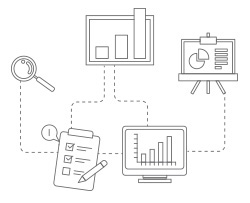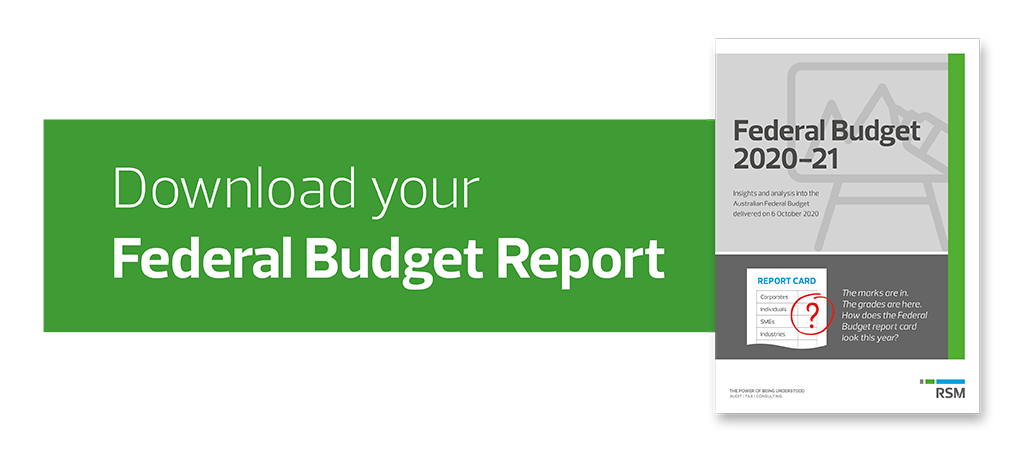What the 2020-21 Western Australian state budget means for you and your business
Keeping Western Australians safe and creating jobs was the stated major focus of the WA State Budget that has forecast a modest surplus. 
The State’s revenue base has been impacted by the COVID-19 pandemic, the largest impacts being on payroll tax, transfer duty, and the State’s GST grants, the latter reflecting weaker national consumption and a smaller GST pool (including as a result of the second lockdown in Victoria). In Western Australia’s case, these impacts have been cushioned, to an extent, by the elevated iron ore price and the recent Bell Group settlement.
Despite the COVID-19 pandemic, the State Government still posted a budget surplus of $1.7 bn at the end of the 2019-20 financial year and the economy grew by 1.1%.
The State Government has projected an operating surplus of $1.2 bn for the 2020-21 financial year, notwithstanding the initiatives announced in the 2020-21 budget, in complete contrast to the Federal Budget position.
| Infrastructure and Construction > | Businesses > |
| Households > | Download our Federal Budget report > |
The key points of the Budget are:
- General Government sector revenue is estimated to total $34.1 bn in 2020-21.
- Revenue overall has been revised down by $1.7 bn, as a result of COVID-19 relief measures, lower taxation income, and lower GST-related grants.
- The impact on the State’s revenue base due to the COVID-19 pandemic has been partially offset by the elevated iron ore price, given the steps taken by WA to keep the industry open and running safely during COVID-19.
- Net debt will rise by $8.3 bn over the forward estimates relative to the 2019-20 Mid-year Review.
All in all, the State Budget appears to be restrained in the relief that it is providing, whilst seeking to reinvest the surpluses into infrastructure projects with the stated aim of creating and supporting jobs. For the average Western Australian business and household, there is not a lot of new announcements in the State Budget that will provide any relief in the short term.
Notwithstanding the position that Western Australia is in as compared to the other states, the State Government is likely to be heavily criticised for the budgeted surpluses rather than investing those to help households and businesses through the continued recovery phase.
Infrastructure and Construction 
The main focus of the WA State Budget is on sustaining and creating jobs through funding a number of infrastructure projects, including maintenance programs of public facilities.
Funding for infrastructure projects
The Federal Budget brought down on Tuesday 6 October 2020 included funding for new and accelerated infrastructure projects in Western Australia of $1.1 bn.
The WA State Budget builds upon the Federal Budget with a planned $27.1 bn to be spent on infrastructure investment programs over the next four years, including $7.5m being spent in regional WA.
Large infrastructure programs include:
- $492m to upgrade and refurbish schools across the State.
- $300m for new and upgraded sports, community, and cultural facilities.
- $266m on-road and other transport-related infrastructure, including rail and port facilities.
- $170.5m of new State funding to establish inner-city university campuses, establish a CBD Transport plan, and begin rejuvenation of the Perth Cultural Centre Precinct.
- $167m to build and upgrade TAFE campuses.
- $95m to upgrade and refurbish police stations.
Spending for regional Western Australia
- $38.9m to upgrade infrastructure in remote communities.
- $150m investment in the tourism industry to fund improvements at holiday spots such as Margaret River, Monkey Mia, and Ningaloo.
- $18.4m of targeted support for regional aviation through securing regional routes and lower airfares and supporting travel agents impacted by COVID-19.
Spending on services and education
The WA State Budget also provides additional funding for community services and education in the state which should create jobs and help address shortages in the short term. This spending includes:
- $306m invested in additional funding for community and hospital-based services and mental health.
- $76m for the arts industry, including a $30m upgrade to the Perth Concert Hall.
- Funding for an additional 800 police officers over the next four years in addition to the 300 additional police officers already being delivered.
- $62m for a TAFE and training sector recovery package including free TAFE short courses targeting displaced workers and an expansion of the Lower Fees, Local Skills initiative to incorporate female-dominated industry courses.
Home Building
The State Government’s Building Bonus grant, in conjunction with the Federal Government’s HomeBuilder program, has, according to the Government, seen almost a doubling of the HIA’s Builder Pipeline in the three months since its announcement in early June, helping to secure 65,000 jobs in the industry. To support the incentive, an additional $30m on top of the $117m investment has been committed due to the strong demand. Whilst not a new announcement, the additional funding indicates that this has stimulated demand in the industry.
In addition to the Building Bonus, the State Government has committed $317m towards social housing to both support the building industry, but also provide increased housing stock to vulnerable Western Australians.
Duty
Unfortunately for home buyers, there were no proposed changes to rates of Duty imposed on transactions.
The Off-the-Plan Duty Rebate Scheme has been temporarily expanded to contracts entered into between 4 June 2020 and 31 December 2020 for the purchase of a new unit or apartment, in a multi-tiered strata development, that is already under construction. This measure was introduced to promote investment and stimulate jobs in the construction industry. Eligible transactions for the expanded scheme will be able to receive a transfer duty rebate of 75% of duty paid, up to a maximum value of $25,000.
The original Off-the-Plan Duty Rebate is available to owner-occupiers and investors who enter into a preconstruction contract between 23 October 2019 and 23 October 2021 to purchase a new residential unit or apartment in a multi-tiered strata scheme. Transactions eligible for the original rebate will receive a transfer duty rebate of 75% of duty paid, up to a maximum value of $50,000.
Businesses 
Unfortunately, local businesses do not appear to have received any new direct support with the WA State Budget reiterating the previously announced and implemented changes under the WA Recovery Plan. The State Government is very much focussing its resources on kickstarting infrastructure and building projects.
Payroll tax
There were a number of announcements included in the Budget that had been previously announced and implemented. They include:
- The bringing forward of the increase of the payroll tax exemption threshold to $1m by six months to 1 July 2020.
- The four-month payroll tax waiver for employers who have annual taxable wages less than $7.5m as of 29 February 2020.
- A payroll tax grant of up to $17,500 for eligible small to medium-sized businesses.
- A payroll tax exemption for wages provided under the JobKeeper scheme.
There were no new changes to Payroll taxes announced.
Other Benefits
Other support to businesses previously announced include:
- Up to $100m to waive a range of licence fees for affected sectors including trades, commercial fishing, and tourism.
- Waiver of liquor licence renewal fees for 2020 with refunds provided to any business that had already paid these fees.
- $2,500 offset for electricity bills for some 95,000 small businesses.
Households
Western Australian households will receive a one-off $600 credit towards their next electricity bill as part of the 2020–21 state budget, the State Government has announced.
All residential Synergy and Horizon Power account holders as of 4 October 2020 will receive the payment, with the rollout of the scheme commencing from 1 November 2020. The credit is expected to provide the average WA household with approximately four months of relief from having to pay their electricity accounts.
The initiative will cost the Government about $644m, with the funds coming from the proceeds of the Bell Group settlement.
The $600 credit follows other support and relief measures announced by the WA Government earlier this year as part of its $5.5 bn WA Recovery Plan. The relief package included a freeze on all household fees and charges — including electricity, water, and vehicle registration — until July next year, at a budget cost of $402m. Additionally, the Energy Assistance Payment — a rebate given to concession card holders — was doubled to $610.
For further information regarding the WA State Budget, contact your local RSM adviser.


